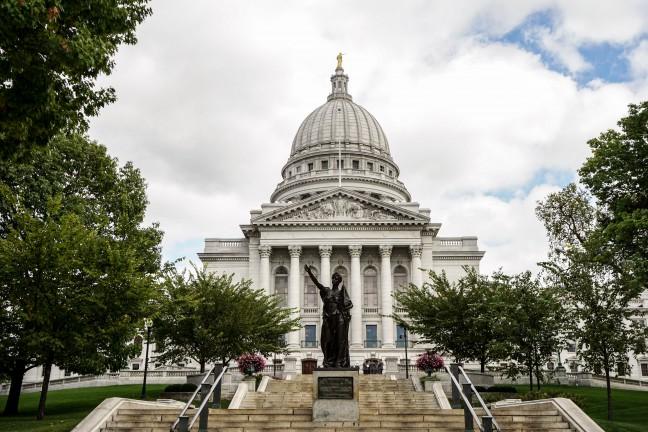As Gov. Tony Evers prepares to introduce the 2019-21 state budget Feb. 28, balancing the concerns of a Republican-controlled Legislature, his Democratic allies and citizen concerns has proven to be a challenge.
John Witte, a University of Wisconsin public affairs and political science emeritus professor, said there are multiple contentious issues for Republicans and Democrats. One such issue is transportation.
“There’s an agreement that roads need to be fixed — but how they pay for their roads will be contentious,” Witte said. “The Republican issue is that they refuse to raise taxes to fund that rebuilding. How are they planning to find that money — increasing the gas tax, or something else?”
According to a report from 1000 Friends of Wisconsin, more than 15,000 miles of local road are “failed, very poor or poor” and need reconstruction. Additionally, more than 27,000 miles of local roads are “fair,” but need repair. Such conditions have ranked Wisconsin as 44th in road quality, according to an infrastructure rating from 2016.
Evers’ campaign site listed infrastructure and transportation as a “top priority.” The site mentions his plans to work with both Democrats and Republicans, invest more in local road maintenance and increase funding for public transit.
Witte also said tax cuts could prove to be a rift as budget deliberations begin later this year.
“What Evers wants to do is repeal some of the exemptions that are passed for corporations and agriculture,” Witte said. “Corporations are also paying minimal taxes — there’s really no corporate tax left in Wisconsin. Evers wants to reinstate that.”
Witte said Republicans will likely oppose those measures.
Rep. Dianne Hesselbein, D-Madison, the assistant Assembly minority leader, said education is a key issue for Wisconsinites.
“Education has always been the number one thing I’ve heard about,” Hesselbein said. “People are very passionate about supporting the university here, along with K through 12 funding.”
Hesselbein cited concerns about special education as well, saying she personally wanted to see more funding there.
According to reporting from WISC, parents of special needs children at multiple schools in Madison cited poor experiences of segregated settings, a lack of curriculum, a lack of funding and staff, and inappropriate discipline.
Hesselbein also mentioned a desire to keep professors rooted in Wisconsin.
“Professors living in [Madison] have left due to the cutting and gutting of UW,” Hesselbein said. “There’s an erosion of public trust, and professors want be able to do their jobs without being micromanaged.”
Witte agreed that funding education was a prominent statewide concern, adding that Evers’ education background and heavy campaigning on the topic played a key role in his victory.
During Evers’ first State of the State address earlier this year, he explicitly mentioned education as something he would like to see addressed in this first budget.
Evers called for $600 million more for special education, restoring two-thirds funding to Wisconsin’s K-12 schools, closing achievement gaps, expanding early childhood and summer school grant programs, and increasing mental health funding as reforms he would like to see included in the budget.
Evers also said his budget would offer a “clear pathway” to increasing the state’s minimum wage.
Witte and Hesselbein both mentioned clean water initiatives as key for citizens, as the issue has played prominently in rural communities.
“Agricultural and dairy farms produce huge amounts of manure and it’s difficult to get rid of it,” Witte said. “Putting it in tanks is hard. It can mess with the water if not properly disposed of, so that’s an issue in the water supply.”
The Department of Health Services lists well contamination from manure as “a serious short-term health risk.” The site states that a number of residential wells in Wisconsin become contaminated by manure and agricultural runoff each year.
The site also said manure-related issues in water are frequently caused by liquid manure being spread during months where the soil cannot absorb it all.
Witte said the drilling of wells is another cause for citizen concern over water quality.
“There are deep capacity wells being drilled in the middle of state,” Witte said. “They can use one million gallons a day. It’s a very contentious issue.”
Reporting from Wisconsin Watch found that high-capacity wells can exacerbate the statewide issue of arsenic in water. The oxygen that causes the issue can be introduced to water sources by well drilling and disinfection methods.
The article cited a report that said levels of arsenic in water above the federal standard had been detected in 51 of Wisconsin’s 72 counties.
Hesselbein said a key difference in Wisconsin’s state government compared to many others is Evers’ “selective veto pen.” Evers has the ability to reject specific portions of the budget, without rejecting the budget outright.
“The vetoes have to be specific … ,” Hesselbein said. “It’s tricky, and I’m not entirely sure what Governor Evers is going to do.”
Witte added that this feature would make for this session to be one of “particular interest.”
Hesselbein stressed that she wanted students to come out and take part in the process as well.
“I encourage young voices to be heard, and to let people know what matters to you,” Hesselbein said. “Your voices are valid, important and we need to hear from you.”


